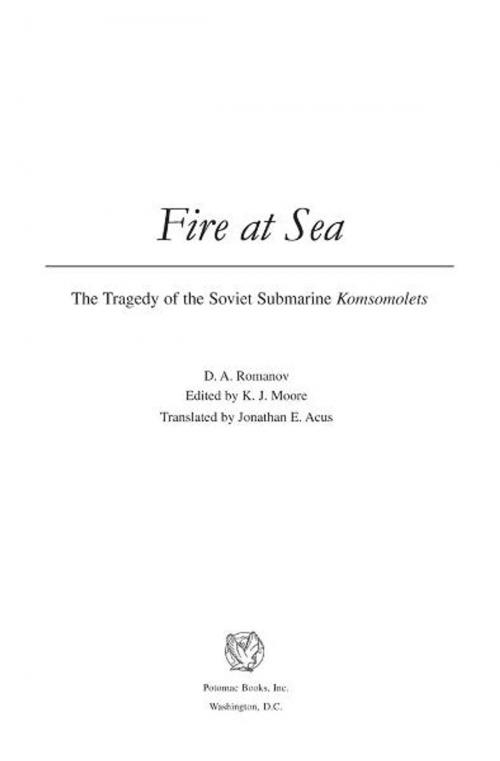| Author: | D. A. Romanov | ISBN: | 9781612342153 |
| Publisher: | Potomac Books Inc. | Publication: | March 31, 2006 |
| Imprint: | Language: | English |
| Author: | D. A. Romanov |
| ISBN: | 9781612342153 |
| Publisher: | Potomac Books Inc. |
| Publication: | March 31, 2006 |
| Imprint: | |
| Language: | English |
This book is the first complete English-language edition of D. A. Romanov's vigorous defense of the people and institutions that built the ill-fated Soviet nuclear attack submarine Komsomolets which caught fire and sank in the Norwegian Sea on April 7, 1989, while on its first patrol. Afterward, the Soviet Navy claimed that numerous technical imperfections had caused the accident. In addition, official investigators portrayed the crew as self-sacrificing and well trained, upheld the commanding officer's actions, and found no fault in behavior among the dead or surviving crew members.
Buoyed by Mikhail Gorbachev's glasnost, dissident voices challenged the official view. The resulting controversy ruined careers, damaged personal and professional relationships, and divided the Navy itself. Romanov refutes the Soviet Navy's claim that from the very beginning it had done everything to ensure that Komsomolets was well prepared for independent patrolling, that it had trained the crew well, and that the submarine's personnel had performed capably during the accident.
Observers familiar with the issues and the acrimony that surround the loss of the Russian submarine Kursk in August 2000 will find startling antecedents in the Komsomolets incident. Readers interested in submarine operations and technology, Cold War navies, Russia, and the dark side of personal and bureaucratic behavior will be thoroughly satisfied by this comprehensive study of what really happened and the ensuing cover-up.
Buoyed by Mikhail Gorbachev's glasnost, dissident voices challenged the official view. The resulting controversy ruined careers, damaged personal and professional relationships, and divided the Navy itself. Romanov refutes the Soviet Navy's claim that from the very beginning it had done everything to ensure that Komsomolets was well prepared for independent patrolling, that it had trained the crew well, and that the submarine's personnel had performed capably during the accident.
Observers familiar with the issues and the acrimony that surround the loss of the Russian submarine Kursk in August 2000 will find startling antecedents in the Komsomolets incident. Readers interested in submarine operations and technology, Cold War navies, Russia, and the dark side of personal and bureaucratic behavior will be thoroughly satisfied by this comprehensive study of what really happened and the ensuing cover-up.
This book is the first complete English-language edition of D. A. Romanov's vigorous defense of the people and institutions that built the ill-fated Soviet nuclear attack submarine Komsomolets which caught fire and sank in the Norwegian Sea on April 7, 1989, while on its first patrol. Afterward, the Soviet Navy claimed that numerous technical imperfections had caused the accident. In addition, official investigators portrayed the crew as self-sacrificing and well trained, upheld the commanding officer's actions, and found no fault in behavior among the dead or surviving crew members.
Buoyed by Mikhail Gorbachev's glasnost, dissident voices challenged the official view. The resulting controversy ruined careers, damaged personal and professional relationships, and divided the Navy itself. Romanov refutes the Soviet Navy's claim that from the very beginning it had done everything to ensure that Komsomolets was well prepared for independent patrolling, that it had trained the crew well, and that the submarine's personnel had performed capably during the accident.
Observers familiar with the issues and the acrimony that surround the loss of the Russian submarine Kursk in August 2000 will find startling antecedents in the Komsomolets incident. Readers interested in submarine operations and technology, Cold War navies, Russia, and the dark side of personal and bureaucratic behavior will be thoroughly satisfied by this comprehensive study of what really happened and the ensuing cover-up.
Buoyed by Mikhail Gorbachev's glasnost, dissident voices challenged the official view. The resulting controversy ruined careers, damaged personal and professional relationships, and divided the Navy itself. Romanov refutes the Soviet Navy's claim that from the very beginning it had done everything to ensure that Komsomolets was well prepared for independent patrolling, that it had trained the crew well, and that the submarine's personnel had performed capably during the accident.
Observers familiar with the issues and the acrimony that surround the loss of the Russian submarine Kursk in August 2000 will find startling antecedents in the Komsomolets incident. Readers interested in submarine operations and technology, Cold War navies, Russia, and the dark side of personal and bureaucratic behavior will be thoroughly satisfied by this comprehensive study of what really happened and the ensuing cover-up.















